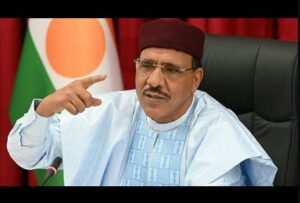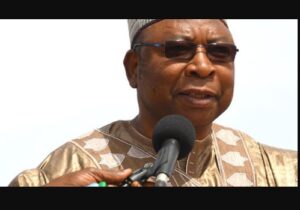Niger, a landlocked country in West Africa, has experienced significant political changes since gaining independence from France on August 3, 1960. Below is a table listing the Presidents of Niger, arranged in order, along with the years of their tenure.
| No. | President | Tenure |
|---|---|---|
| 1 | Hamani Diori | 1960 - 1974 |
| 2 | Seyni Kountché | 1974 - 1987 |
| 3 | Ali Saibou | 1987 - 1993 |
| 4 | Mahamane Ousmane | 1993 - 1996 |
| 5 | Ibrahim Baré Maïnassara | 1996 - 1999 |
| 6 | Daouda Malam Wanké | 1999 |
| 7 | Mamadou Tandja | 1999 - 2010 |
| 8 | Salou Djibo | 2010 - 2011 |
| 9 | Mahamadou Issoufou | 2011 - 2021 |
| 10 | Mohamed Bazoum | 2021 - Present |
READ ALSO: Presidents That Have Ruled Cameroon Till Date
The First President:

Hamani Diori served as the first President of Niger from 1960 to 1974. He played a pivotal role in leading Niger to independence and was a prominent figure in the African independence movement.
Notable Achievements:
- Independence and Stability: Diori’s leadership was instrumental in securing Niger’s peaceful transition to independence from French colonial rule.
- Diplomatic Relations: He established strong diplomatic ties with other nations, particularly France, which provided economic and technical assistance.
- Educational Development: His administration prioritized education, leading to the establishment of various schools and educational programs.
Downsides:
- Economic Challenges: Despite his efforts, Niger’s economy remained heavily dependent on foreign aid and faced significant challenges, including droughts and famine.
- Authoritarian Rule: Diori’s regime became increasingly authoritarian over time, leading to political dissatisfaction and unrest.
- Overthrow: In 1974, Diori was overthrown in a military coup led by Lieutenant Colonel Seyni Kountché, ending his presidency.
READ ALSO: Presidents That Have Ruled Madagascar Till Date
The Current President:

Mohamed Bazoum became the President of Niger in 2021, succeeding Mahamadou Issoufou. Bazoum, a member of the Nigerien Party for Democracy and Socialism (PNDS-Tarayya), has a background in education and politics.
Notable Achievements:
- Economic Reforms: Bazoum has focused on implementing economic reforms aimed at boosting growth and reducing poverty.
- Security Improvements: His administration has made strides in improving national security, particularly in combating terrorism and insurgency in the Sahel region.
- Social Programs: Bazoum has introduced social programs to improve healthcare, education, and women’s rights, emphasizing the need for inclusive development.
Downsides:
- Security Challenges: Despite efforts to improve security, Niger continues to face significant threats from extremist groups, leading to ongoing violence and instability.
- Economic Hardships: The country still struggles with economic difficulties, including high unemployment rates and limited infrastructure development.
- Political Tensions: Bazoum’s presidency has been marked by political tensions and opposition challenges, reflecting the broader complexities of Nigerien politics.
READ ALSO: Presidents That Have Ruled Mozambique Till Date
The Current Prime Minister:

While Niger does not have a Vice President, the position of the Prime Minister serves as the head of government. The current Prime Minister is Ouhoumoudou Mahamadou, appointed in 2021.
Notable Achievements:
- Government Coordination: Mahamadou has been crucial in coordinating government activities and ensuring the implementation of the President’s policies.
- Economic Initiatives: He has played a significant role in promoting economic initiatives, particularly in the areas of agriculture and infrastructure.
- International Relations: Mahamadou has worked to strengthen Niger’s international relations, securing partnerships and aid from various countries and organizations.
Downsides:
- Administrative Challenges: The Prime Minister faces challenges in administrative efficiency and bureaucratic hurdles, which can slow down policy implementation.
- Public Discontent: There has been public discontent over economic conditions and governance issues, reflecting broader frustrations within the country.
READ ALSO: Presidents That Have Ruled Ethiopia Till Date
Conclusion
Niger’s political history is marked by a series of leadership changes, each with its unique challenges and achievements. From the first President, Hamani Diori, to the current President, Mohamed Bazoum, the country has navigated a complex landscape of independence, economic development, security issues, and political transitions.
While progress has been made in various areas, Niger continues to face significant challenges that require ongoing efforts and reforms to ensure a stable and prosperous future for its citizens.
